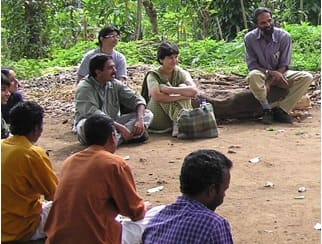
Traditional communities
Traditional is a term used to characterise those communities or peoples that maintain livelihoods, beliefs and values, knowledge, languages and institutions in some continuity with the past.[1] What is traditional is most often perceived as symbolically close to the past, or as the ancestors used to practice, live, believe, know. It can refer to all sorts of aspects of cultural, social, spiritual or economic practices (such as customs, ceremonies, customary laws, stewardship role for the territory of life…). The term ‘traditional’, however, should not be equated with ‘static’, pre-determined and never changing, in particular referring to knowledge, practices or beliefs that indeed adapt over time to varying circumstances even for very traditional communities or peoples. Traditional thus stands for linked to the past, as in a continuum that binds the past to the present but that has seen, and will continue to see, changes to respond to the evolving history of the community.
The concept of cultural continuity similarly highlights the continuum of experiences from past to present, onward and into the future. Continuity combines innovation with convention[2] and has been found to have direct impacts on the communities’ sense of wellbeing, including health, as measured by both social and economic indicators.[3] Cultural continuity also has been used to describe a “culture […] potentially enduring or continuously linked through processes of historical transformation with an identifiable past of tradition”.[4]
Communities that have a strong bond with their past generally also have a strong bond with their territories. When they stress that they are traditional, they tend to reclaim both their past and its values, but also their traditional knowledge and rich relationship with their territories (see also #Traditional Knowledge).
Key references:
Wagner, 1981; Chandler and Lalonde, 1998; Posey, 1999; Kirmayer et al., 2007; Oster et al., 2014; Raymond-Yakoubian, Raymond-Yakoubian and Moncrieff et al., 2017.
[1]A similar term, mostly used to underline the existence of historical rights to lands, water and other gifts of nature is historical community.
[2] Wagner, 1981.
[3] See, e.g., Chandler and Lalonde, 1998; Oster et al., 2014; Foggin, 2011; Foggin, 2014.
[4] Kirmayer et al., 2007, cited in Oster et al., 2014.